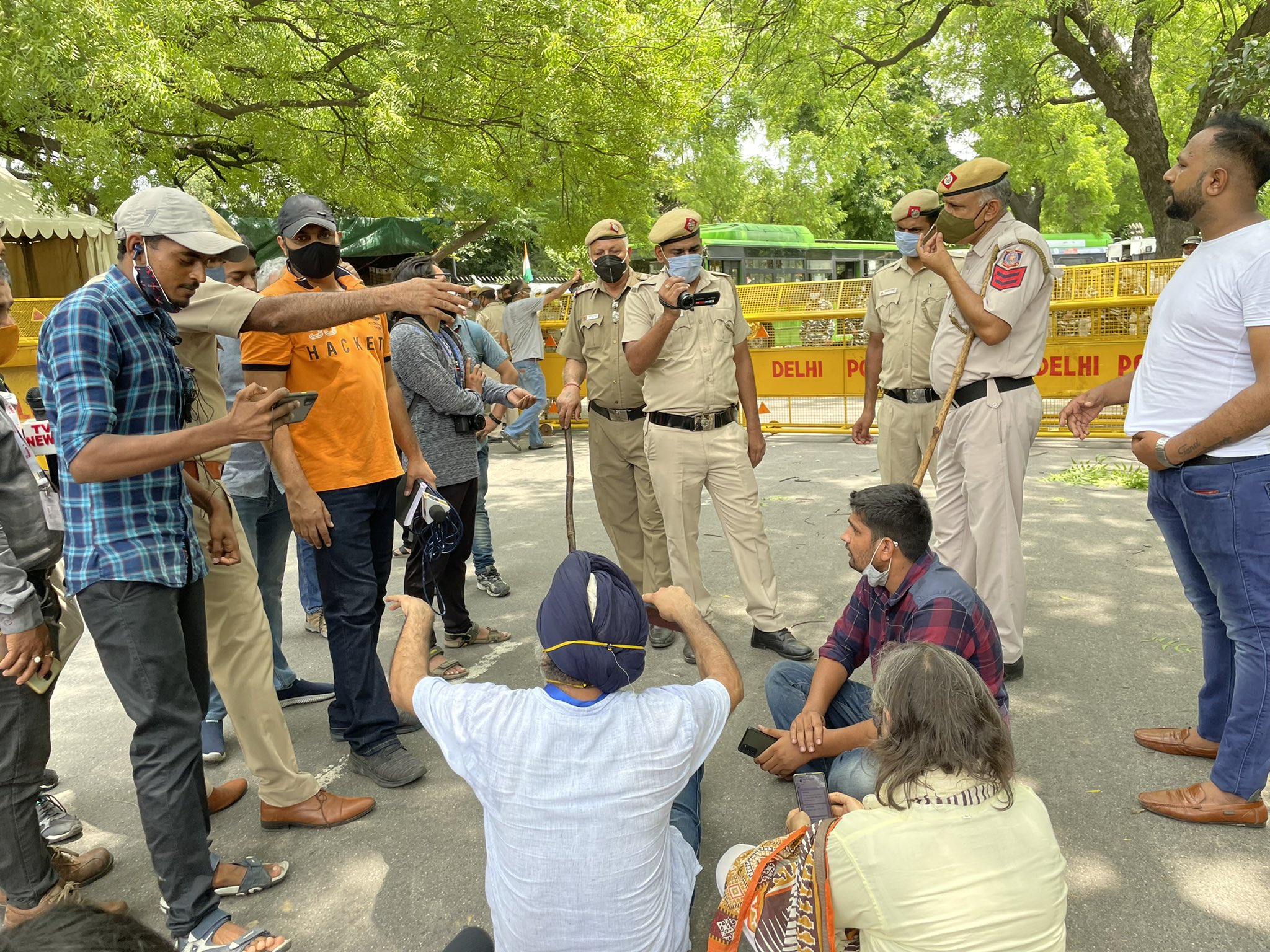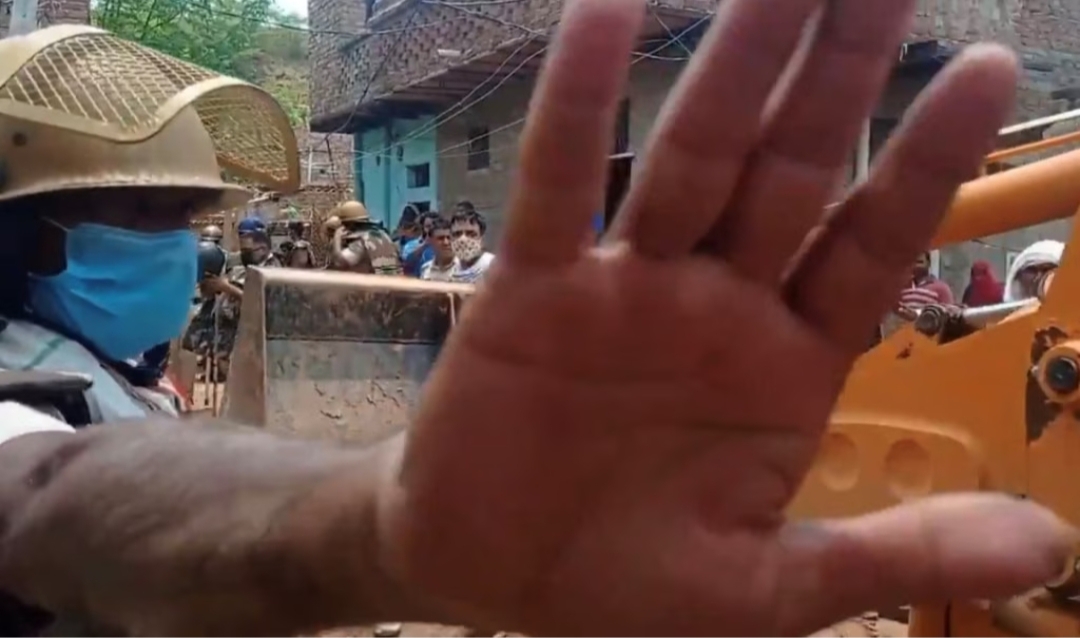“Was asked to stop recording Khori Gaon villagers,” independent journalists decry 'police harassment'

Several independent journalists were denied access to cover the recent farmer's protest at Jantar Mantar, New Delhi and the Khori Gaon demolition in Haryana. The aggrieved journalists said they are being denied access as independent journalists and freelancers have played a key role in covering the farmer's protests while "mainstream media has only played into the propaganda."
Samriddhi Sakunia | TwoCircles.net
NEW DELHI – In recent times, journalists in India – especially those who work with independent media outlets or freelancers, have been prevented from covering protests such as at Jantar Mantar, New Delhi by farmers or by villagers of Khori Gaon whose houses were demolished in a Supreme Court ordered drive.
After the Supreme Court ordered the demolition of Khori Gaon in the Faridabad district of Haryana, several journalists were prevented from covering the demolition. As per reports, the police apart from threatening journalists and obstructing them "arrested several villagers who were protesting against the demolition.”
In a similar incident, several journalists were denied entry inside Jantar Mantar where the farmers were protesting against the three farm laws. As per the aggrieved freelance and independent journalists, they were made to sit “near the barricade which was quite far from the protest site.”
‘I was asked to stop filming testimonies of Khori Gaon villagers’
Sumedha Pal, a reporter at the Newsclick shared her experience on covering the Khori Gaon demolition.
On July 30, when Pal visited the site to record the testimonies of the villagers gathered there, several officers repeatedly asked Pal to stop filming.
As per Pal, she filmed the scene which showed the aggression of the police against the villagers. “A senior police officer ordered another officer to confiscate my phone while I was filming the police action against the demonstrators,” Pal told TwoCircles.net, adding, “As soon as the officer approached towards me and tried to grab my phone, I stopped filming and fled the scene.”
Pal said she was threatened and obstructed by the Police when she tried to film the demolition. “A police officer even tried to block my camera as I filmed the visuals at the site,” she said.
[caption id="attachment_443269" align="aligncenter" width="1080"] A police officer trying to block the camera of journalist Sumedha Pal as she was covering the Khori Gaon demolition site | Photo by Sumedha Pal[/caption]
A police officer trying to block the camera of journalist Sumedha Pal as she was covering the Khori Gaon demolition site | Photo by Sumedha Pal[/caption]
According to Pal, she was carrying her press card every time she visited Khori Gaon to cover the demolition, but “I still had to face such behaviour.”
‘Female officers were ordered to beat me if I resisted’
On July 16, when Nikita Jain, an independent journalist was at the Khori Gaon demolition site taking pictures and videos, an unknown person in civvies approached her and asked her to stop filming. “He threatened to inform the police if I didn’t stop recording,” Jain told TwoCircles.net.
Nikita said that when she was leaving the village, “a group of 10 police officers surrounded me and told me that media coverage was prohibited in the area.”
Nikita asked the officer to show an official order stating that media coverage wasn’t allowed. “He refused and asked me to show them my phone and delete all my footage,” she said.
Nikita said that when she refused to hand over her phone, “the officer ordered female cops to take me away and ordered them to beat me if I resisted.”
As per Nikata, the officers threatened to break her phone. “I was adamant and left the village,” she said.
In a similar incident on July 22, journalists were denied access to cover farmers protests at Jantar Mantar. Several journalists took to Twitter about the resistance they had to face from the police. They complained of the treatment meted out to them just because “they don’t have a PIB (Press Information Bureau) issued press card.”
‘They didn’t let journalists stand close to barricades without a press card'
On June 22, many policemen at the Jantar Mantar protest site stopped several journalists who visited the site to cover the farmer’s protest.
Sandeep Singh, an independent journalist who has been covering the farmers protest from the beginning, was one of the several journalists who were denied entry.
Sandeep took to Twitter and posted a picture with a caption saying that like him "several other journalists were denied entry."
The independent journalists were asked to show PIB issued press cards which according to Prabhat Singh, another independent journalist, “isn’t available with more than 90% of the journalists.”
The journalists sat on a protest and demanded to be allowed to cover the protest like other media outlets. The journalists were later allowed to cover the protests but were “only allowed to stand near the barricades.”
On July 23, Sandeep Singh visited the protest site again and found out that the police weren’t allowing journalists who didn't possess a press card to cover the protest.
“Most of the independent journalists here don’t have press cards and they work without the card,” Sandeep said.
As per Sandeep, he was not allowed to even stand near the barricades because he didn’t have a press card. Journalists working with mainstream media outlets were allowed entry. “Independent journalists and other YouTubers have played a huge role in covering the farmer’s protest from the beginning. Do you think they hold a press card to enter the protest site?” asked Sandeep.
“The mainstream media which just tries to spread propaganda is being permitted while independent journalists like me who play a key role in pushing forward the truth of the protests in terms of media coverage are denied access,” Sandeep added.
